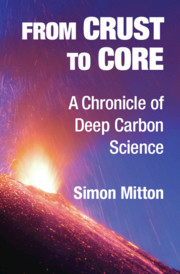Book contents
- From Crust to Core
- From Crust to Core
- Copyright page
- Dedication
- Contents
- Foreword
- Acknowledgments
- Introduction
- 1 Why Carbon in Earth Matters
- 2 The Origin of Deep Carbon in Deep Space
- 3 Deliveries of Cosmic Carbon Continue
- 4 On the Nature of Earth’s Interior
- 5 Earth’s Physical Interior Revealed
- 6 Thousands, Millions or Billions
- 7 Physics and Chemistry of Deep Earth
- 8 Confronting the Continental Drift Conundrum
- 9 The Mid-Atlantic Ridge and Rift Valley
- 10 Earth’s Deep Dynamics Discovered
- 11 Reversals of Fortune
- 12 Deep Carbon
- 13 Carbon-Bearing Phases in the Mantle
- 14 Diamond in the Mantle
- 15 Deep Life
- Glossary
- Biographical Notes
- Index
- References
11 - Reversals of Fortune
Published online by Cambridge University Press: 19 December 2020
- From Crust to Core
- From Crust to Core
- Copyright page
- Dedication
- Contents
- Foreword
- Acknowledgments
- Introduction
- 1 Why Carbon in Earth Matters
- 2 The Origin of Deep Carbon in Deep Space
- 3 Deliveries of Cosmic Carbon Continue
- 4 On the Nature of Earth’s Interior
- 5 Earth’s Physical Interior Revealed
- 6 Thousands, Millions or Billions
- 7 Physics and Chemistry of Deep Earth
- 8 Confronting the Continental Drift Conundrum
- 9 The Mid-Atlantic Ridge and Rift Valley
- 10 Earth’s Deep Dynamics Discovered
- 11 Reversals of Fortune
- 12 Deep Carbon
- 13 Carbon-Bearing Phases in the Mantle
- 14 Diamond in the Mantle
- 15 Deep Life
- Glossary
- Biographical Notes
- Index
- References
Summary
The outstanding issue with reversals concerned the fidelity of the spreading ocean crust as a magnetic tape recorder: some geologists asked themselves if the reversals could have occurred spontaneously in the rocks sampled. This conundrum could be resolved by obtaining accurate dates of formation for groups of rocks with normal and reversed polarity, and so determining whether the rock magnetism reversed in sync or not. In the 1950s, uranium–lead (U–Pb) radiometric dating was not accurate enough for younger rocks because the half-life of uranium is so long, which meant the quantity of lead was insufficient for analysis by the technology then available. By the end of the 1950s, two groups of geochemists, one at the United States Geological Survey (USGS), Menlo Park, California, and the other at Australian National University, had developed the techniques of potassium–argon (K–Ar) dating to the stage where it could be used on young rocks, such as lava flows, with ages of hundreds of thousands to a few million years.
Information
- Type
- Chapter
- Information
- From Crust to CoreA Chronicle of Deep Carbon Science, pp. 211 - 233Publisher: Cambridge University PressPrint publication year: 2020
